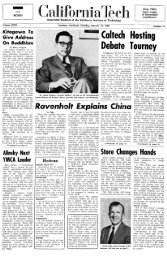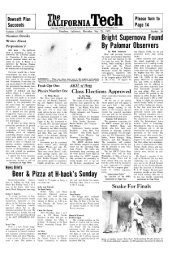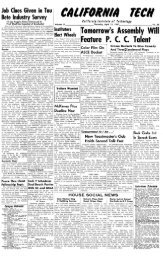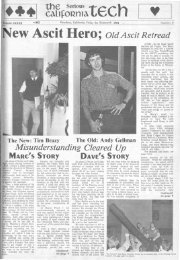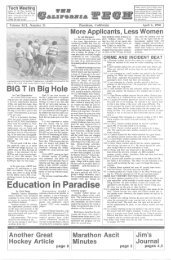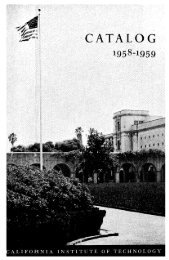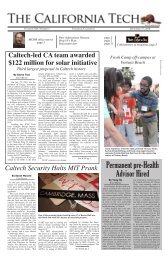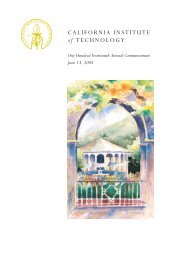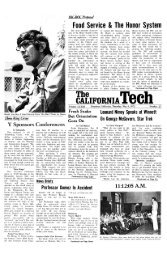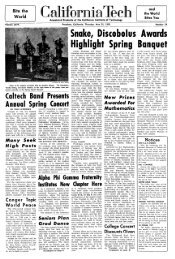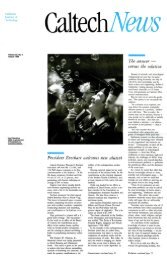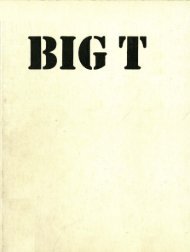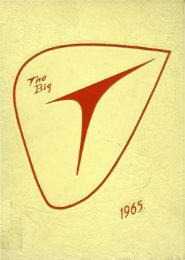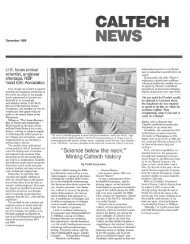PDF (1941) - CaltechCampusPubs
PDF (1941) - CaltechCampusPubs
PDF (1941) - CaltechCampusPubs
You also want an ePaper? Increase the reach of your titles
YUMPU automatically turns print PDFs into web optimized ePapers that Google loves.
CHEMISTRY AND CHEMICAL ENGINEERING 201<br />
Ch. 50. Advanced Organic Laboratory. Units to be arranged; any term.<br />
Laboratory practice in the synthesis of typical organic compounds.<br />
Instructors: Buchman, Koepili, Lucas, Niemann, Zechmeister.<br />
Ch. 61 a, b, c. Industrial Chemi.try. 6 unin (2-0-4). first and third<br />
terms; 4 units (2-0-2), second term.<br />
Prerequisite.: Ch. 21 a, b.<br />
A study of the more important industrial chemical processes, from the point of<br />
view not only of the chemical reactions, but of the conditions and equipment necessary<br />
to carry on these reactions.<br />
Text: Industrial Chemistry, Read.<br />
Instructor: Wilson.<br />
Ch. 62. Engineering Chemistry. 9 units (3-0-6); first term.<br />
Prerequisite: Ch. 1 a, b, c.<br />
Reading, discussion and problems dealing with the application of chemical principles<br />
to engineering problems and the relations of engineering to the chemical<br />
industries.<br />
Text: Chemistry of Engineering Materials, Leigbou.<br />
Instructor: Wilson.<br />
Ch. 63 a, b, c. Chemical Engineering Thermodynamics. 6 units (2-0-4),<br />
second, third, and first terms.<br />
Prerequisite: Ch. 21 a.<br />
Class exercises and problems in engineering thermodynamics studied from the<br />
point of view of the chemical engineer.<br />
Text: Thermodynamics of One-component Systems, Lacey and Sage.<br />
Instructor: Lacey.<br />
Ch. 80-86. Chemical Re.earch.<br />
Opportunities for research are afforded to undergraduate students in all the<br />
main branches in chemistry; thus, in analytical or inorganic chemistry (Ch. 80),<br />
in physical chemistry (Ch. 82), in organic chemistry (Ch. 84), and in applied<br />
chemistry (Ch. 86). Such research may be taken as electives by students in honor<br />
standing in the sophomore and junior years; and every candidate for a degree in<br />
the Chemistry Option is required to undertake in his senior year an experimental<br />
investigation of a problem in chemistry. A thesis embodying the results and conclu<br />
.ions of this investigation must be submitted to the faculty not later than one week<br />
before the degree is to be conferred.<br />
FIFTH-YEAR AND ADVANCED SUBJECTS<br />
Ch. 113 a, b. Inorganic Chemistry. 4 units; first and second terms.<br />
Selected groups of inorganic compounds will be considered from modern physicochemical<br />
view-points; thus with reference to their physical properties, their thermodynamic<br />
constants (their heat-contents, free-energies, and entropies), their ratel of<br />
conversion into one another (including effects of catalysis and energy radiations).<br />
and their molecular structure and valence relations.<br />
Instructor: Yost.<br />
Ch. 122 a, b. Thermodynamic Chemistry. 6 units (2-0-4), first term; 9<br />
units (3-0-6), second term.<br />
This subject is open to students who have had a course in physical chemistry.



